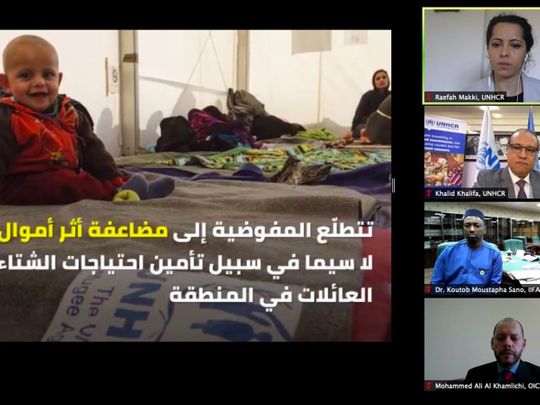Dubai: The United Nations High Commissioner for Refugees (UNHCR) has appealed for an additional $211.3 million (Dh777.16 million) to support 3.8 million refugees and internally displaced persons (IDPs) in the Middle East and North Africa (Mena) region and help them cope with the coming harsh winter conditions.
During a press conference on Monday, senior UNHCR officials said “funds like Zakat and Sadaqah will help provide families with core winter relief items, cash support, and in-kind assistance to weatherproof their homes when the cold starts to pose a struggle for survival.”
Last winter, the UNHCR provided emergency assistance to 3 million refugees and IDPs in the Mena region, including Syria, Lebanon, Jordan, Iraq and Egypt. The UN Refugee Agency noted this year, the COVID-19 pandemic has pushed more people into poverty and economic hardship.
“Refugees’ poor living conditions and greater exposure to winter weather makes them more vulnerable to COVID-19 and other life- threatening illnesses. With domestic support systems already stretched, more aid is needed this year to support some 3.8 million vulnerable displaced persons in Mena during the winter months. Over the 2020- 2021 winter period, UNHCR is raising funds for Syrian, Iraqi, and Yemeni IDPs as well as refugees living in Syria (mostly Iraqis), Yemen (mostly Somalis), Iraq, Lebanon, Egypt, and Jordan (mostly Syrians). In Yemen, aside from its winter cash assistance programme, UNHCR is also launching a pilot project to design and source safer cooking and heating stoves,” UNHCR elaborated.
Fatwa for charity
The UNHCR also said a fatwa was issued by the International Islamic Fiqh Academy (IIFA), a subsidiary of the Organisation of Islamic Cooperation (OIC) to receive and distribute Zakat funds.
UNHCR’s Refugee Zakat Fund is used for humanitarian assistance (cash and in-kind assistance) to refugees and IDPs in Yemen, Lebanon, Iraq, Jordan, Egypt, Bangladesh, and Mauritania, among other OIC countries.
Overcoming COVID-19 challenges
The UNHCR also launched on Monday its 2020 Midyear Islamic Philanthropy Report — Winter Edition. The UN Refugee Agency said despite the challenges created by the COVID-19 pandemic, $46 million in Zakat and US$9.2 million in Sadaqah funds were received through the Refugee Zakat Fund between January and June this year. These donations — including 100 peer cent of the Zakat funds received — will be utilised to provide support to more than 1.8 million vulnerable refugees and IDPs by the end of the year.
Dr. Koutoub Moustafa Sano, IIFA secretary general, said: “Islam is the religion of solidarity and compassion, with Zakat as one of its five pillars. Providing necessary support for the eligible and needy is a noble religious, moral and humanitarian duty. People with the means to do so, whether individuals or groups across the globe, can participate in providing support and assistance for refugees and displaced people who are in need of life-saving aid and struggling under the weight of poverty and disease.”
Khaled Khalifa, UNHCR’s senior adviser on Islamic Philanthropy and Representative to GCC, added: “Zakat holds a uniquely vast potential to help address pressing humanitarian issues and plays a significant role in providing life-saving support to the most vulnerable refugees and IDPs. UNHCR launches such reports as part of its commitment to unlock the power of Zakat and Sadaqah for the benefit of those who have been forcibly displaced worldwide.”
More information about the UN Refugee Zakat Fund can be found on its website.

